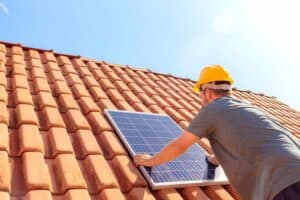Perhaps adopting a blended approach between implementing renewable energy while still utilising fossil fuels could help South Africa maintain energy independence.

While in favour of the benefits it offers, Portfolio Manager and Business Unit Head at Sasfin Securities, Mohil Bandulal advises South Africans to truly consider the socio-economic impact of the over-zealous implementation of renewable energy on a developing country such as South Africa.
“The issue of Renewable Energy is a hotly debated subject and, in many instances, an emotive one – one, I too can reflect on it from my own personal observations.
“One cannot deny the benefit of renewable energy in the interests of a cleaner environment and in lowering global warming. The recent invasion of Ukraine by Russia has brought energy issues to the fore particularly in Europe where we have seen significant build-up of renewable energy projects over the last decade, which together with gas, coal and nuclear, provided the energy needs of many of the developed economies in Europe.
“However, the events in Ukraine and the resultant constricted gas supplies from Russia into Western Europe is a stark reminder of the need to maintain energy independence,” he said.
ALSO READ: Renewable energy: Good for the planet and the pockets of South Africans
Developed countries vs underdeveloped countries
Bandulal says that the western world has over the last 200 years enjoyed enormous benefit from the utilisation of fossil fuels, which have helped propel growth of their economies.
But he asks: where do developing countries stand relative to developed countries that have had the benefit of cheap fossil fuels over the last century and a half and have been significant contributors to climate change? Should developing countries be subject to the same standards of implementation or should they have a longer lead time to implementation? Can emerging or developing economies afford wholesale adoption of renewable energy?
NOW READ: Transition from coal to renewable energy is the way to go, says Ramaphosa
Bandulal reckons that there are several challenges that developing countries will likely experience in implementing renewable energy.
“There is a significant capital cost of procuring and installing clean energy projects relative to existing conventional sources of energy. There is also a lack of large-scale human resources to build, maintain and operate large scale clean energy projects. We must also note that there are compressive government policies pertaining to the development, implementation, quantum and future of clean energy within a framework of economic growth,” he advised.
SA still has some way to go
Closer to home, SA has been experiencing its own energy crises for more than a decade with the national energy supplier Eskom unable to meet demand for a variety of reasons.
But government has recently created an enabling environment for private producers to sell into the national grid in an effort to alleviate the energy challenges that South Africans face.
In light of this, Bandulal believes that South Africa may not at this point afford the cost of implementing renewable energy as the primary source of energy generation, moreso given the host of significant challenges including the need to fund education, security, healthcare and policing amongst others.
ALSO READ: Ramaphosa asked to act against Mantashe for ignoring renewable energy ultimatum
“Additionally, wholesale implementation of renewable energy as the only source of our energy requirements will no doubt result in the decommissioning of Eskom power production units which are largely coal based. What happens to the employees of Eskom? How many of them can retrained and absorbed into clean energy projects? Can we afford to direct significant capital to clean energy when our country has so many challenges including unemployment?” he asks.
A blended approach
Bandulal suggests that perhaps adopting a blended approach of allowing private capital to build up South Africa’s renewable energy generation capacity alongside the national power producer may work, but asks, how would government control the pricing of electricity in order for it to balance the demands of an acceptable return on capital to the clean energy private producers relative to the need to provide low-cost electricity to its populace and industry in order to grow the economy.
“The recent announcement by President Ramaphosa to enlist the private sector to urgently add much, much more capacity to the grid suggests that South Africa is looking towards private capital to implement additional generation capacity inclusive of clean energy projects.
ALSO READ: ANC wants to establish second power parastatal to challenge first, failed power parastatal (Eskom)
“This will no doubt, once implemented help alleviate SA’s energy challenges in addition to minimising the need for government to allocate capital to build clean energy projects,” Bandulal says.
“It strikes me that South Africa will need to consider an approach that meets our specific requirements. One that provides an enabling environment for clean energy producers while maintaining their existing reliance on fossil fuels to meet short and medium term demands for base electricity and peaking capacity in a cost-effective manner,” he concluded.
*Mohil Bandulal is a Portfolio Manager and Business Unit Head at Sasfin Securities. He has managed global and local discretionary share portfolios for the past 30 years – he discusses the future of renewable energy in his personal capacity.






